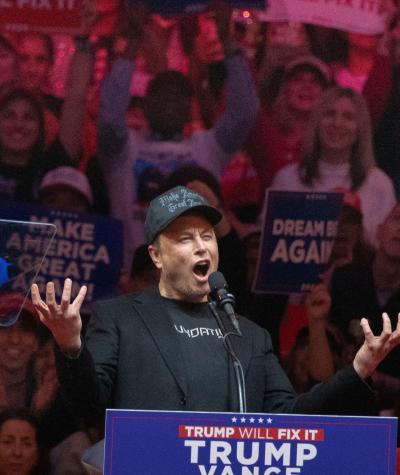After launching a full-scale attack on our system of checks and balances and threatening the ability of our government agencies to function in service to the American people, unelected billionaire Elon Musk is leaving public office.
Accountability for our public officials does not end when they leave government — the public deserves to know if President Donald Trump gave his biggest donor the opportunity to unlawfully enrich himself when he handed Musk the keys to the federal agencies.
That’s why Campaign Legal Center (CLC) is calling on the Office of Government Ethics (OGE) to determine whether Musk and all other employees that are now departing the U.S. DOGE Service complied with financial disclosure requirements.
How Ethics Laws Apply to Musk
One of Trump’s first executive orders rebranded the U.S. Digital Service as the “Department of Government Efficiency” (DOGE) and placed significant power in Musk’s hands.
Trump’s picks for his Cabinet and other high-ranking positions have drawn a fair amount of scrutiny for the many ethics concerns they bring to their posts, and Musk is no exception.
When a president nominates someone with conflicts of interest to public office, ethics laws require that the government and nominees themselves take steps to highlight potential conflicts and remedy them before their confirmation.
Musk was reportedly a “special government employee,” someone expected to work for the federal government for no more than 130 days in a 365-day period. Accordingly, Musk is covered by a law that prohibits government employees from participating in matters that would impact their financial interests.
However, Musk and other employees have now departed DOGE without providing insight into their financial holdings. In fact, it appears that only six of the approximately 82 publicly identified DOGE employees have filed the required financial disclosure statements while the status of the others is unknown.
How DOGE May Help Musk Line His Pockets
With so much latitude to advise on spending, regulations and government contracting, Musk had significant opportunities to advance his own personal business interests.
The scope of what Elon Musk stands to gain from directing agency reconstruction is incalculable. Musk and the federal government are already deeply intertwined: His companies Tesla and SpaceX account for at least $15.4 billion in government contracts over the past decade and span multiple agencies.
Musk’s power to influence which agencies must cut costs or how government contracts are allocated opened the door for him to enhance his personal fortune.
Some of the plans Musk announced in his short tenure clearly interact with his business interests; his proposal to put the U.S. Treasury on a blockchain could potentially involve his own cryptocurrency technologies, and CLC filed an ethics complaint against Musk for possibly influencing the Federal Aviation Administration to use products from SpaceX subsidiary, Starlink.
At DOGE, Musk potentially accessed information that could influence his business decision making, such as access to the federal payment system, which contains details of public contractors who compete directly with Musk’s own businesses.
Even with the limited information available on DOGE’s functions and authority within the government, it is abundantly clear that Musk had several opportunities to direct policy or decision-making that could benefit his bottom line for years to come.
Enforcing the Law and Holding DOGE Accountable
Even after leaving public service, DOGE employees are all still subject to criminal conflict of interest laws.
The executive branch’s actions impact every single American — from agencies that regulate our food, water and environment to decisions that impact healthcare, taxes and education. If DOGE employees undertook policymaking that benefitted their personal bottom line — at the detriment of the public — they must be held accountable.
The Ethics in Government Act (EIGA) created the OGE to oversee the executive ethics program and to prevent and resolve conflicts of interest. As part of this role, the OGE has the authority to conduct a review to determine whether DOGE employees have done the proper financial disclosure reporting.
The OGE must provide assurance to the public that DOGE employees are following the ethics laws and rules that apply to all executive branch officials.
Upholding Ethics Standards in Trump’s Second Term
Ethics experts have been sounding the alarm since before Election Day that wealthy special interests were poised to have an excessive amount of influence on the federal government under a second Trump administration.
While the president’s biggest donors seem to be rewarded with political favors and countless opportunities to enrich themselves, CLC continues to highlight the reforms and enforcement needed to uphold a higher ethics standard for the federal government.
We will continue to call on the OGE to do its job in the executive branch, and we will continue to work with lawmakers to preserve independent ethics enforcement where it exists.
Our work with Musk is not done either. We are currently in court fighting for relief for the everyday Americans suffering the consequences of DOGE’s illegal policymaking. We have also joined partners in their efforts in the U.S. Supreme Court to uphold federal transparency laws that that could uncover critical information on the entity.
Now is the time to enforce the guardrails of democracy that will ensure that executive power cannot be auctioned off to the highest bidder by any president to come.
Support CLC's work to make sure our government serves the American people, not the business interest of wealthy donors.


